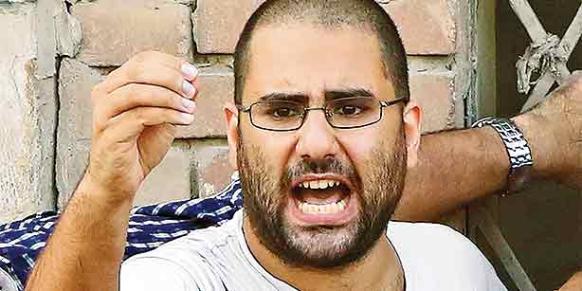Egyptian pro-democracy activist Alaa Abdel Fattah has been jailed for five years for breaking a protest law and assaulting a policeman.
The blogger was previously given a 15-year jail term, and was freed on bail last year.
Alaa Abdel Fattah gained fame during the 2011 uprising as a campaigner against military trials for civilians.
Al-Jazeera journalists Mohamed Fahmy and Baher Mohamed also appeared in the same court on February 23 at the start of their retrial.
The men were freed on bail earlier this month after more than a year behind bars. They are next due in court on March 8.
The journalists are accused of spreading false information and of helping the banned Muslim Brotherhood organization.
Australian Peter Greste, the third journalist in the case, was freed on February 1 and deported to Australia.
Alaa Abdel Fattah was charged under laws that prohibit protests without prior government permission.
The activist was accused of organizing an illegal protest in 2013, and of assaulting a policeman.
Rights groups say the charges are politically motivated and form part of a broader crackdown on dissent under President Abdul Fattah al-Sisi, a former army chief.
Other defendants on trial with Alaa Abdel Fattah received sentences ranging from 3 to 5 years.
There was uproar in the courtroom after the verdicts, with supporters of the defendants calling for an end to military rule in Egypt.
Defense lawyers said they would appeal against the ruling.
Rights groups have also criticized the case against the al-Jazeera journalists, describing it as an assault on press freedom.
At their original trial, Peter Greste and Mohamed Fahmy were sentenced to seven years in prison. Baher Mohamed received an additional three-year sentence on a separate charge involving possession of weapons.
The defendants denied the charges, describing their trial as a sham.
Their convictions were overturned on January 1, when the courts ordered a retrial. Exactly one month later, Peter Greste was released and deported to Australia.
Several students have also been held in the same case. The students deny working for al-Jazeera but it is thought that material filmed on their phones was used by the network.
